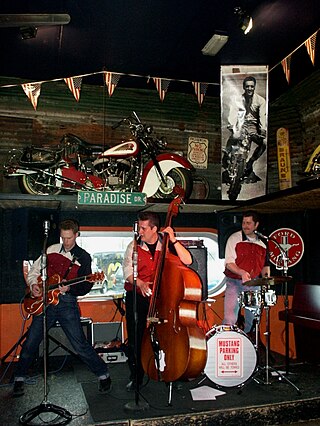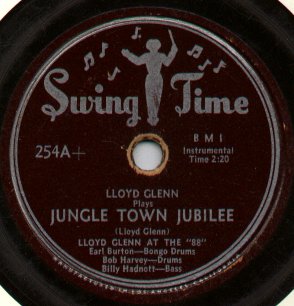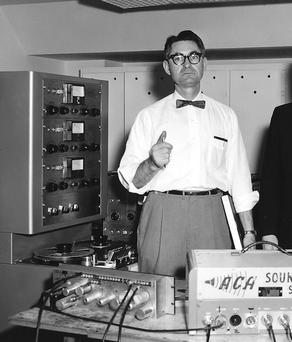Rhythm and blues, frequently abbreviated as R&B or R'n'B, is a genre of popular music that originated in African-American communities in the 1940s. The term was originally used by record companies to describe recordings marketed predominantly to urban African Americans, at a time when "urbane, rocking, jazz based music ... [with a] heavy, insistent beat" was becoming more popular. In the commercial rhythm and blues music typical of the 1950s through the 1970s, the bands usually consisted of a piano, one or two guitars, bass, drums, one or more saxophones, and sometimes background vocalists. R&B lyrical themes often encapsulate the African-American experience of pain and the quest for freedom and joy, as well as triumphs and failures in terms of relationships, economics, and aspirations.

Rockabilly is the earliest style of rock and roll music. It dates back to the early 1950s in the United States, especially the South. As a genre it blends the sound of Western musical styles such as country with that of rhythm and blues, leading to what is considered "classic" rock and roll. Some have also described it as a blend of bluegrass with rock and roll. The term "rockabilly" itself is a portmanteau of "rock" and "hillbilly", the latter a reference to the country music that contributed strongly to the style. Other important influences on rockabilly include western swing, boogie-woogie, jump blues, and electric blues.

Swing Time Records was a United States-based record label active in the late 1940s and early 1950s. The label was founded by Jack Lauderdale in 1947 as Down Beat Records and was headquartered in Los Angeles, California. In approximately October 1949 the name was changed to Swing Beat Records, and around March 1950 the name was changed again to Swing Time. The company went bankrupt in 1953 but continued releasing singles as late as February 1954.

Lowell Fulson was an American blues guitarist and songwriter, in the West Coast blues tradition. He also recorded for contractual reasons as Lowell Fullsom and Lowell Fulsom. After T-Bone Walker, he was the most important figure in West Coast blues in the 1940s and 1950s.

Starday Records was an American record label producing traditional country music during the 1950s and 1960s.

David "Fathead" Newman was an American jazz and rhythm-and-blues saxophonist, who made numerous recordings as a session musician and leader, but is best known for his work as a sideman on seminal 1950s and early 1960s recordings by Ray Charles.
Robert L. Geddins was an American San Francisco Bay Area blues and rhythm and blues musician and record producer.
"Tramp" is a soul blues song with funk elements, written by West Coast blues artists Lowell Fulson and Jimmy McCracklin. First recorded by Fulson in 1967, it was his highest-charting single since "Reconsider Baby" in 1954. The song was covered by Otis Redding in a duet with Carla Thomas, and this version reached No. 2 on Billboard R&B chart.
Linda Hayes was an American rhythm and blues singer.

"Driftin' Blues" or "Drifting Blues" is a blues standard, recorded by Johnny Moore's Three Blazers in 1945. The song is a slow blues and features Charles Brown's smooth, soulful vocals and piano. It was one of the biggest blues hits of the 1940s and "helped define the burgeoning postwar West Coast blues style". "Driftin' Blues" has been interpreted and recorded by numerous artists in various styles. The Blues Foundation Hall of Fame and the Rock and Roll Hall of Fame have acknowledged the influence and lasting popularity of the song.

"3 O'Clock Blues" or "Three O'Clock Blues" is a slow twelve-bar blues recorded by Lowell Fulson in 1946. When it was released in 1948, it became Fulson's first hit. When B.B. King recorded the song in 1951, it became his first hit as well as one of the best-selling R&B singles in 1952.

"Reconsider Baby" is a blues song written and recorded by Lowell Fulson in 1954. Performed in the West Coast blues style, it was Fulson's first record chart hit for Checker Records, a subsidiary of Chess Records. With memorable lyrics and a driving rhythm, "Reconsider Baby" became a blues standard and has been recognized by the Blues Foundation and Rock and Roll Halls of Fame.

Blues Summit is the thirty-third studio album by B.B. King released in 1993 through the MCA label. The album reached peak positions of number 182 on the Billboard 200, and number 64 on Billboard's R&B Albums chart. The album won a Grammy Award in 1994 for Best Traditional Blues Album.

William Dwight Holford, Sr. was an American recording engineer and record producer. For 44 of those years, from 1948 to 1982, he was the affiliated with ACA Studios in Houston as an owner, partner, and audio engineer. Holford also helped build studios for several labels, including Duke/Peacock, Starday, Sarg Records, and Trumpet Records.

"No Place for Me" is the debut single of country singer-songwriter Willie Nelson. Nelson recorded the song while working as a disc jockey at KVAN in Vancouver, Washington, using a studio of the radio. Through a DJ he met during his time working on the radio in Texas, he contacted Starday Records, sending the tapes over to the label.

Supreme Records was a small, independent record label based in Los Angeles that existed from 1947 to 1950. It was founded by dentist Albert Patrick and specialized in rhythm and blues. Its artists included Jimmy Witherspoon, Paula Watson, Buddy Tate, Eddie Williams and his Brown Buddies, Big Jim Wynn, and Percy Mayfield.
Little Caesar was an American singer and actor. He began his recording career in the 1950s, recording for labels such as Modern and Recorded In Hollywood. He had a hit on the R&B chart with "Goodbye Baby" in 1952. As an actor, Harry Caesar was best known for his roles in The Longest Yard (1974) and A Few Good Men (1992).
Stanley Joseph Lewis was an American record label owner, in Shreveport, Louisiana.
Spirit of the Black Territory Bands is an album by the American musician Johnny Otis, credited as Johnny Otis and His Orchestra. It was released in 1992. The album is a tribute to the music of the territory bands of Otis's youth; Otis played with several such bands in the 1940s.
"Too Many Drivers"is a blues song recorded by Big Bill Broonzy in 1939. It is performed in an acoustic ensemble-style of early Chicago blues and the lyrics use double entendre often found in hokum-style blues songs. The song has been identified as one of Broonzy's more popular tunes and has been recorded over the years by a variety of artists, who often who use alternate titles, such as "Little Car Blues", "Little Side Car", "Automobile Blues", and "Let Me Ride Your Little Automobile".












